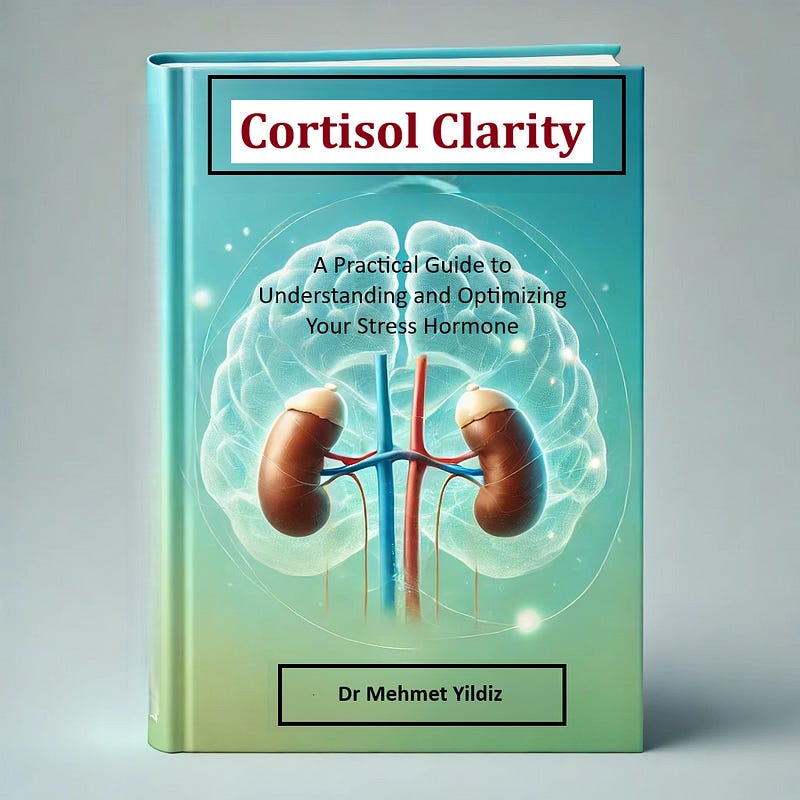Why Cortisol Is a Tricky Hormone and How We Can Manage It In Smart Ways
An Editorial Review of “Cortisol Clarity: The Complete Guide to Understanding and Managing Cortisol” hitting the bookstore today
Book Review for Mental Health Professionals also published on Medium.

Stress is an inevitable part of everyday life and it is necessary for our survival. Cortisol, the stress hormone, with its brother and sister hormones plays a big role in how we handle it. It also interact with major hormones like insulin affecting almost all aspects of our lives.
Today, I want to review a unique book by
in its launch day to show my appreciation and inform my new readers. This is my second story on Medium. I am a new writer and plan to write more stories like this in 2025. I remained as an avid reader in 2024 but I plan to join partner program soon.In Cortisol Clarity: The Complete Guide to Understanding and Managing Cortisol, the author dives into what makes cortisol so important and how it affects both our bodies and minds. This book is a great resource for anyone who wants to understand stress better, especially mental health professionals.
You may ask what qualified me to review this book and make bold statements to inform and inspire you. Firstly, I had the privilege of being a beta reader for the book.
Moreover, Dr Yildiz, who invited me to this platform as a reader and potentially to become a writer also asked me to be a line editor as a former psychiatrist. He believed my contributions could refine the book and make it a valuable resource for his readers both the public and health coaches.
While line-editing the book and reviewing feedback from hundreds of beta readers I learned a lot about the nuances which I missed during my working years. I used to only look at its mental health aspect but I also noticed that it has a tremendous impact on our physical health and fitness including weight gain or loss.
My collaborators in the mental health communities think of cortisol as only the “stress hormone,” but it’s much more than that. As the author explains, cortisol works with every cell, tissue, and system in the body. It’s like an alarm system, helping us deal with challenges. But if it stays too high for too long, it can cause problems. If it is too low, it can be life-threatening.
From my professional angle, one of the most interesting points is how cortisol affects the brain. It doesn’t just respond to stress — it also changes how we think and feel.
High cortisol can make us anxious, mess with our memory, and even cloud our judgment and might lead to depression.
On the other hand, low cortisol, like in burnout or PTSD, can leave us feeling tired, unmotivated, and detached. Understanding these effects is really helpful for anyone working in mental health.
The book does a great job showing how modern lifestyle keeps our stress levels high. Unlike our ancestors, who faced short bursts of stress, we deal with constant pressures like deadlines, notifications, and noisy environments.
This never-ending stress keeps our cortisol levels high and can lead to mental health issues like anxiety and depression which I dedicated my decades of professional life for diagnosing and treating.
The mental health part of the book really hits home. It makes you think about how modern life makes it so much harder to “turn off” stress. It also explains how this ongoing stress can create a cycle that’s tough to break.
Cortisol follows a daily rhythm. It’s usually highest in the morning to help us wake up and lowest at night so we can sleep. But things like late-night screen time or shift work can mess with this rhythm. When that happens, it can lead to problems like insomnia, fatigue, or even mood swings.
The mental health section of the book gives simple tips to fix these issues. For example, better sleep habits and cutting down on evening screen time can help get cortisol levels back on track. These tips are practical and easy to follow.
The book offers a lot of guidance on how to keep cortisol balanced and optimal. The author explains that managing cortisol isn’t just about medication. It’s about making lifestyle changes, improving your mindset, and sometimes even changing how you live day to day.
Things like mindfulness, guided therapy, and healthy habits can all help. The book also talks about how practices like daily meditation or self-therapy lowers elevated cortisol level and help people feel calmer and more in control. These tips are simple enough for anyone to try and stay calm and composed.
Why This Book Matters for Mental Health Professionals
As someone in mental health, I can assure you that this book gives you tools to connect biology and psychology.
Knowing how cortisol works can help you understand what’s going on with clients who feel stuck in stress, anxiety, or trauma. The book also explains how cortisol affects other hormones and critical systems in the body, which can help you take a more holistic approach with clients.
The best part of this book is how it empowers readers. It helps people understand their stress and gives them clear, actionable steps to feel better. By working with health professionals and using these strategies, anyone can start managing their stress more effectively.
Cortisol Clarity: The Complete Guide to Understanding and Managing Cortisol goes beyond science. It’s practical and about real life. It shows how stress and too little or too much cortisol affect us and what we can do about it.
For mental health professionals, it’s a valuable resource. For everyone else, it’s a clear and practical guide to feeling better and staying healthy. If you want to understand stress and how to manage it, this book is a go-to guide in 2025.
It was a great pleasure and honor for me to have an early access to this great book published today, 1 January 2025, as gift to us as mental health professionals and those who want to take their health to a new level. You can order it through this link for yourself, a friend, a colleague, or a loved one. It is suitable to every age, gender, culture, and background.
I also listened to the audio version on my Google Play for 6+ hours. It was a pleasant narration as if the book spoke to me.
The author has also introduced it to his audience here on his own words which might give you extra ideas.
Cortisol Clarity: The Complete Guide to Understanding and Managing Cortisol Hormone
Why is cortisol such a tricky hormone, and why did you write a book about it instead of other hormones?medium.com
You may also check out the editorial review by
A Thoughtful Dive into the Cortisol Labyrinth
Five stars for a practical, compassionate, and downright enlightening read for “Cortisol Clarity” by Dr Mehmet Yildiz…medium.com
Thank you for reading my review and I wish you a happy New Year.🎉





Thank you for this wonderful review, Dr Jones. Happy New Year!
Thank you for sharing this valuable book Dr Jones. To pair biology and psychology is an important element to be able to do in life as you relay. For I can hit mental health problems from many different psychological angles, family dynamics, attachment style, defense mechanisms, developmental issues, trauma bonding etc., however, if the problem is more physiological in nature I can talk the problem to death and sometimes a good medical checkup with a physiological specialist is needed.
And sometimes you need a resource such as this to help us walk through various different angles. I'm excited to dive into this book!